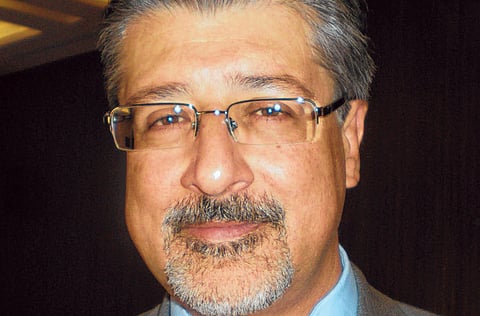Wind speed, solar energy maps soon
Map identifying areas with solar radiation and wind being developed by Irena

Abu Dhabi: Countries can soon easily identify suitable areas for solar and wind energy projects and determine the right technology from a map and a database.
A map identifying the areas with solar radiation and wind in individual countries, and a database of renewable energy technologies are being developed by the Abu Dhabi-based International Renewable Energy Agency (Irena).
Irena's initiatives may popularise the utilisation of renewable energy, minimising the use of fossil fuels which generate 60 per cent of green house gases.
The agency will develop the map in cooperation with World Meteorological Organisation (WMO), said Adnan Z. Ameen, Interim Director-General of Irena.
He said this in his keynote address at a seminar on climate change and energy policy in the Arab region organised by the German Embassy in Abu Dhabi and the Ecologic Institute.
Klaus-Peter Brandes, German Ambassador to the UAE, also addressed the seminar.
Meteorological data
Ameen said he had met the heads of the WMO and the World Intellectual Property Organisation (Wipo) separately and discussed developing the map and the database of intellectual Property Rights (IPR) of renewable energy technologies.
The WMO has the meteorological data from every country, dating back 100 years and part of that data includes solar radiation and wind velocity in all particular areas, he said.
Individual countries can use the map to identify suitable areas to install solar panels and windmills, he said. Speaking to Gulf News on the sidelines of the seminar, Ameen said the maps would be developed very soon as the project does not need any legal framework or agreement, but an understanding between Irena and the WMO was enough to undertake the project.
Huge subsidies on fossil fuel and lack of incentives for renewable energy are a concern regarding the climate change issues as fossil fuels cause 60 per cent of green house gas emissions, Adnan Ameen, Interim Director-General of the International Renewable Energy Agency, said.
Last year, fossil fuel subsidies were over $500 billion (Dh1.8 trillion) dollars according to a paper titled "Global subsidies initiatives" from the International Institute for Sustainable Development. So that renewable energy sector has to compete with the fossil fuels which look cheaper due to subsidies, Ameen said.
Governments gave away over $500 billion subsidies on fossil fuel in 2009
Huge subsidies on fossil fuel and lack of incentives for renewable energy are a concern regarding the climate change issues as fossil fuels cause 60 per cent of green house gas emissions, Adnan Ameen said.
Last year, fossil fuel subsidies were over $ 500 billion dollars according to a paper titled "Global subsidies initiatives" from the International Institute for Sustainable development. So that renewable energy sector has to compete with the fossil fuels which look cheaper due to subsidies, Ameen said.
Renewable energy targets
About 85 countries have policy instruments to develop renewable energy use. Around 100 countries have set targets, mostly for 2020 and beyond. In the Middle East, Abu Dhabi targets 7 per cent of electricity generation from renewables by 2020; Kuwait aims for a 5 per cent share of renewable energy in electricity balance by 2020; Bahrain 5 per cent of electricity by 2010 and Jordan 10 per cent in final energy by 2010.
In North Africa, Morocco's goal is to reach 42 per cent of electricity coming from Renewable energy until 2020; Egypt aims 20 per cent by 2020: Tunisia aims to reach saving 22 per cent of energy consumption until 2016 and the share of electricity from renewable energy in Algeria was almost 10 per cent in 2008
Source: Irena
Sign up for the Daily Briefing
Get the latest news and updates straight to your inbox



